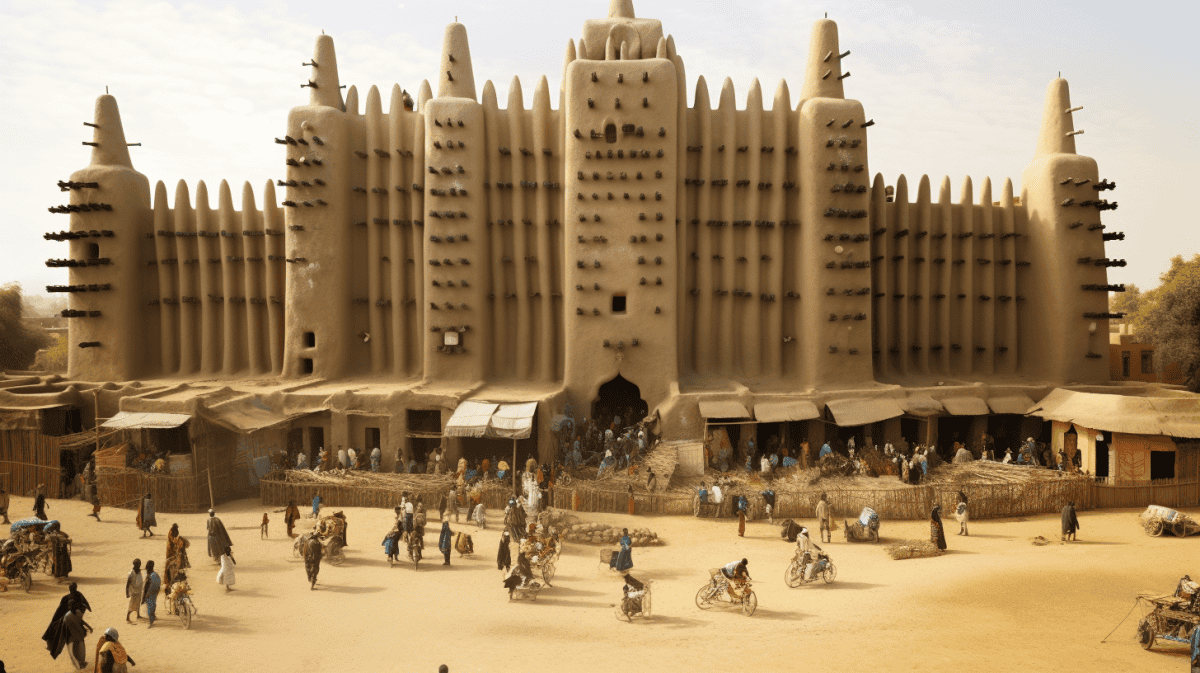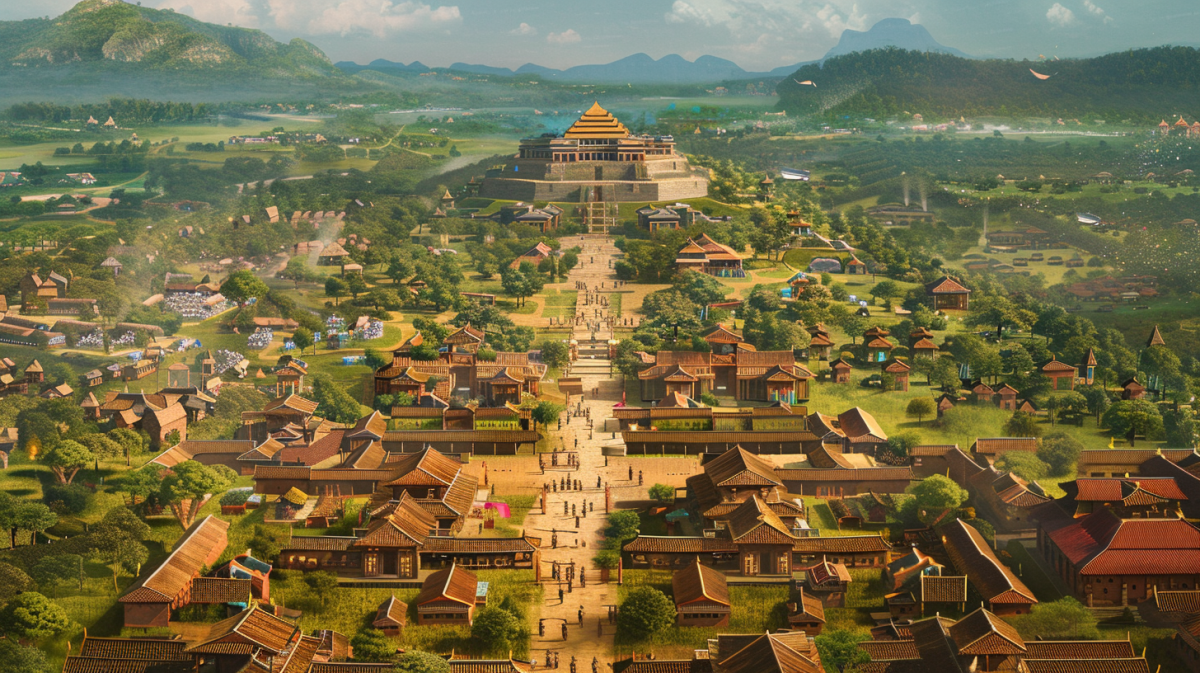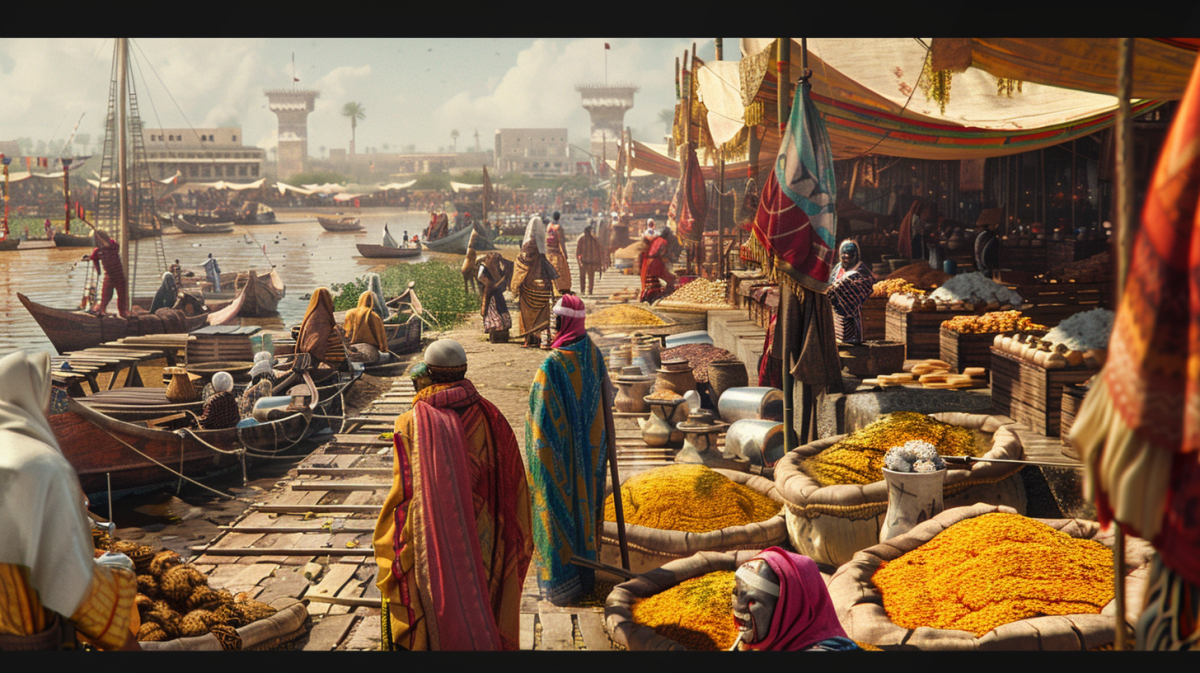The Kingdom of Ghana, flourishing between the 4th and 11th centuries in West Africa, wasn’t related to modern Ghana but was a vital gold trading centre. Situated between the Niger and Senegal rivers, it acted as a conduit between North and Sub-Saharan Africa, accumulating immense wealth and influence.
The Soninke tribe founded the ancient kingdom of Ghana and the word “Ghana” meant king in their language. The capital city of this kingdom was Koubmi Saleh, this is where the king lived in his palace. Researchers estimated that approximately 20,000 people lived in this area. The Arabs called the ancient kingdom of Ghana Wagadou or Awkar to describe the mysterious but rich place they observed. The kingdom was also known as the “Land of Gold” and for good reason.

Most of the prosperous history of the ancient kingdom of Ghana is based on writings from Arab travellers, notably Muhammad al-Idrisi, which came in contact with the people as they described the mysterious but rich place they observed. They noted that the place was so wealthy the horses were adorned in silk rope halters and slept on plush carpets, as well as gold dog collars. The kings of the ancient kingdom of Ghana were considered the richest men in the world.
Ghana’s rule went all the way back to the 4th century but became established as a nation by the Soninke people a few hundred years later. They were the catalyst of the expansion and strengthening of the empire. The ancient kingdom of Ghana took control of a large piece of land between the Senegal Rivers and upper Niger, through strategic expansion. This area was rich in gold which meant Ghana became the leading force in the trans-Saharan trade network.
Trade & Economy in the Ancient Kingdom of Ghana
Economy
Gold was commonly used to purchase salt which was always in great demand because it was used to preserve dried meat whilst also improving the taste of food. There isn’t any evidence that gold was taxed in Ghana like salt and copper but the kings of Ghana carefully controlled it. Any gold nugget that weighed between 25 grams and 1 kilo was the property of the king and he kept it in his palace. This method ensured the market wasn’t flooded and gold dust held its value. Muhammad al-Idrisi, who was an Arab writer noted that a king had a single block of gold that weighed over 13 kilos.
The ownership of gold nuggets meant most of the gold that was being exchanged with traders and ordinary people was in the form of gold dust. The dust was measured using scales and glass weights. In rare cases, gold was used as a currency but this only occurred in a few states. The most common use of gold was to barter on imported goods. The other use was for decoration on all sorts of objects, used by royals on shields, regalia, swords, jewellery, clothing, and dog chains and collars. The abundance of gold and other resources allowed the ancient kingdom of Ghana to have years of prosperous trading and strategic governing which led to a very wealthy empire.

Gold came from the Niger River, Bure, Galam, and Ghiyaru and from traders who brought the metal from gold fields in Bambuk and Senegal rivers. The mineshaft was normally a few metres deep and provided 2.5 – 5 grams of gold. The gold wasn’t refined but the gold was very pure, the metal was melted into bars making transportation of it easier.
The backbone of the kingdom’s economy was mining iron and gold. They used iron to make tools and weapons which made the empire strong. They used Gold to trade with other nations for resources such as cloth, tools, and livestock.
Trade
The king would spread his power and influence internationally through trade. Ghana was bartering gold and ivory for salt and horses from Arabs, cloth, books and swords from North Africans and Europeans.
The ancient kingdom of Ghana was so rich in gold that it achieved its wealth through trade with Arabs. Arab merchants travelled for approximately two months through the desert to Ghana to do business. These merchants were taxed for what they brought in and took out of Ghana. Because of this system, Ghana got rich very quickly.
Government & Politics of the Ancient Kingdom of Ghana
The first king of the kingdom was Dinga Cisse. The kingdom had a feudal government which consisted of local kings. These local kings paid tribute to the high king but they were able to rule their lands as they saw fit.
The king was known as Ghana or war chief and whatever he said was law. He was the head of justice, commander of a very organised army and controlled trade activities. Mayors, counsellors, ministers and civil servants were chosen by the king to assist with administrative duties but the king was always in charge.
Every day the king would assemble his court and allow people to voice their complaints publicly. They were normally neighbourly conflicts and violated rights and the king listens and passed judgements. The hearings were normally peaceful unless they were criminal. The two most serious criminal offences were denying debt and killing. These crimes were tried and this occurred by the criminally accused drinking a foul beverage which consisted of sour and bitter-tasting wood and water. If the accused omitted after drinking this beverage, they would be classed as innocent and congratulated for passing the test. If they did not vomit, they were classed as guilty and suffered the king’s wrath.
The people of lands that were conquered were under supervision for their loyalty as well as their behaviour. If order and obedience were maintained through taxes being paid properly, they would get independence. In areas where they defied the king’s laws, Ghanaian governors were chosen to be watchdogs and reported everything to the king.
Fall of the Ancient Kingdom of Ghana, the rise of the Mali Empire.
Based on accounts from Ibn Khaldan, the ancient kingdom of Ghana was overthrown by the Sosso. Around 1050 CE, the empire was under attack from nations in Northern Africa due to the kings of Ghana refusing to convert to Islam despite pressure from Muslims in the north to convert. Attacks from a Muslim group called Almoravids and the Sosso weakened the empire of Ghana until it became part of the Mali Empire.
Related Posts
Sources
“Ghana.” In Encyclopaedia Britannica. Accessed November 5, 2022. https://www.britannica.com/place/Ghana-historical-West-African-empire.
“Empire of Ancient Ghana.” Ducksters. Accessed November 15, 2022. https://www.ducksters.com/history/africa/empire_of_ancient_ghana.php.
“West African Kingdoms.” USHistory.org. Accessed November 20, 2022. https://www.ushistory.org/civ/7a.asp.




